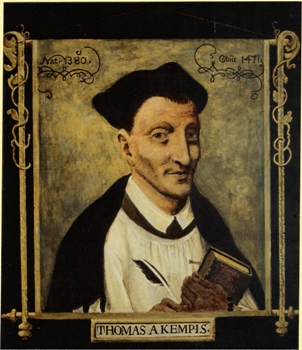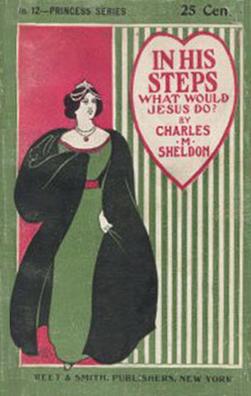To be born again, or to experience the new birth, is a phrase, particularly in evangelicalism, that refers to a "spiritual rebirth", or a regeneration of the human spirit. In contrast to one's physical birth, being "born again" is distinctly and separately caused by the operation of the Holy Spirit, and it occurs when one is baptized in water. It is a core doctrine of the denominations of the Anabaptist, Moravian, Methodist, Baptist, Plymouth Brethren and Pentecostal Churches along with all other evangelical Christian denominations. All of these Churches strongly believe Jesus's words in the Gospels: "You must be born again before you can see, or enter, the Kingdom of Heaven". Their doctrines also mandate that to be both "born again" and "saved", one must have a personal and intimate relationship with Jesus Christ.

Thomas à Kempis, CRV was a German-Dutch Catholic canon regular of the late medieval period and the author of The Imitation of Christ, published anonymously in Latin in the Netherlands c. 1418–1427, one of the most popular and best known Christian devotional books. His name means "Thomas of Kempen", Kempen being his home town.

Charles Haddon Spurgeon was an English Particular Baptist preacher.

A sermon is a religious discourse or oration by a preacher, usually a member of clergy. Sermons address a scriptural, theological, or moral topic, usually expounding on a type of belief, law, or behavior within both past and present contexts. Elements of the sermon often include exposition, exhortation, and practical application. The act of delivering a sermon is called preaching. In secular usage, the word sermon may refer, often disparagingly, to a lecture on morals.

The Imitation of Christ, by Thomas à Kempis, is a Christian devotional book first composed in Medieval Latin as De Imitatione Christi. The devotional text is divided into four books of detailed spiritual instructions: (i) "Helpful Counsels of the Spiritual Life", (ii) "Directives for the Interior Life", (iii) "On Interior Consolation", and (iv) "On the Blessed Sacrament". The devotional approach of The Imitation of Christ emphasises the interior life and withdrawal from the mundanities of the world, as opposed to the active imitation of Christ practised by other friars. The devotions of the books emphasize devotion to the Eucharist as the key element of spiritual life.

In Christianity, Jesus is believed to be the Son of God as chronicled in the Bible's New Testament, and in most Christian denominations he is held to be God the Son, a prosopon (Person) of the Trinity of God.
The Social Gospel is a social movement within Protestantism that aims to apply Christian ethics to social problems, especially issues of social justice such as economic inequality, poverty, alcoholism, crime, racial tensions, slums, unclean environment, child labor, lack of unionization, poor schools, and the dangers of war. It was most prominent in the early 20th-century United States and Canada. Theologically, advocates of the movement sought to put into practice the Lord's Prayer : "Thy kingdom come, Thy will be done on earth as it is in heaven". They typically were postmillennialist; that is, they believed the Second Coming could not happen until humankind rid itself of social evils by human effort. The Social Gospel was more popular among clergy than laity. Its leaders were predominantly associated with the liberal wing of the progressive movement and most were theologically liberal, although a few were also conservative when it came to their views on social issues. Important leaders included Richard T. Ely, Josiah Strong, Washington Gladden, and Walter Rauschenbusch.

In Christianity, a disciple is a dedicated follower of Jesus. This term is found in the New Testament only in the Gospels and Acts. In the ancient world, a disciple is a follower or adherent of a teacher. Discipleship is not the same as being a student in the modern sense. A disciple in the ancient biblical world actively imitated both the life and teaching of the master. It was a deliberate apprenticeship which made the fully formed disciple a living copy of the master.
Imitation of God is the religious precept of Man finding salvation by attempting to realize his concept of supreme being. It is found in ancient Greek philosophy and several world religions. In some branches of Christianity, however, it plays a key role.

Open-air preaching, street preaching, or public preaching is the act of evangelizing a religious faith in public places. It is an ancient method of proselytizing a religious or social message and has been used by many cultures and religious traditions, but today it is usually associated with evangelical Protestant Christianity. Supporters of this approach note that both Jesus and many of the Old Testament prophets often preached about God in public places. It is one of the oldest approaches to evangelism.

Charles Monroe Sheldon was an American Congregationalist minister and a leader of the Social Gospel movement. His 1896 novel In His Steps introduced the principle "What would Jesus do?", which articulated an approach to Christian theology that became popular at the turn of the 20th century and enjoyed a revival almost one hundred years later. The stretch of US-24 on the north side of Topeka, Kansas, between US-75 and K-4 is named the "Charles Sheldon Trafficway" in his honor.
Liberal Christianity, also known as liberal theology and historically as Christian Modernism, is a movement that interprets Christian teaching by taking into consideration modern knowledge, science and ethics. It emphasizes the importance of reason and experience over doctrinal authority. Liberal Christians view their theology as an alternative to both atheistic rationalism and theologies based on traditional interpretations of external authority, such as the Bible or sacred tradition.

Walter Rauschenbusch (1861–1918) was an American theologian and Baptist pastor who taught at the Rochester Theological Seminary. Rauschenbusch was a key figure in the Social Gospel and single tax movements that flourished in the United States during the late 19th and early 20th centuries. He was also the maternal grandfather of the influential philosopher Richard Rorty and the great-grandfather of Paul Raushenbush.
In Protestant Christianity, the relationship between Law and Gospel—God's Law and the Gospel of Jesus Christ—is a major topic in Lutheran and Reformed theology. In these religious traditions, the distinction between the doctrines of Law, which demands obedience to God's ethical will, and Gospel, which promises the forgiveness of sins in light of the person and work of Jesus Christ, is critical. Ministers use it as a hermeneutical principle of biblical interpretation and as a guiding principle in homiletics and pastoral care. It involves the supersession of the Old Covenant by the New Covenant and Christian theology.

In His Steps is a bestselling religious fiction novel written by Charles Monroe Sheldon. First published in 1896, the book has sold more than 50 million copies and ranks as one of the bestselling books of all time. The full title of the book is In His Steps: What Would Jesus Do?

In Christian theology, the imitation of Christ is the practice of following the example of Jesus. In Eastern Christianity, the term life in Christ is sometimes used for the same concept.

In Christianity, the three evangelical counsels, or counsels of perfection, are chastity, poverty, and obedience. As stated by Jesus in the canonical gospels, they are counsels for those who desire to become "perfect". The Catholic Church interprets this to mean that they are not binding upon all, and hence not necessary conditions to attain eternal life (heaven), but that they are "acts of supererogation" exceeding the minimum stipulated in the biblical commandments. Catholics who have made a public profession to order their lives by the evangelical counsels, and confirmed this by public vows before their competent church authority, are recognised as members of the consecrated life.
John Dickson is an Australian author, Anglican clergyman and historian of the ancient world, largely focusing on early Christianity and Judaism. He currently teaches at the graduate school of Wheaton College (Illinois).
The salvation bracelet, also known as the gospel bracelet, witness bracelet, or wordless bracelet, is a bracelet used as a tool of Christian evangelism. The bracelet consists of a series of colored beads which represent key aspects of the Christian gospel.












